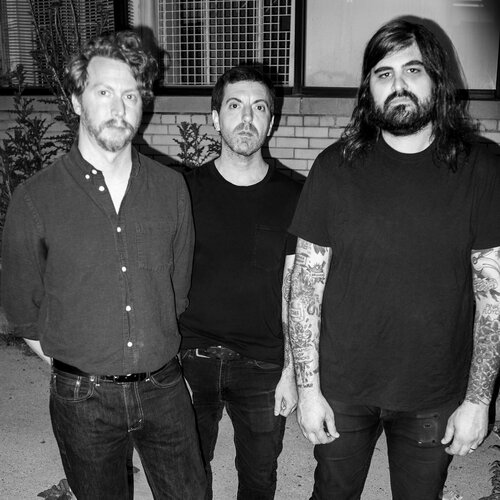Luggage
Luggage
country: USA
genre: Rock
styles: Noise Rock, Rock, Experimental Rock, Experimental Rock

Hand Is Bad
 LP
LP
Spotify Bandcamp Soundcloud
Reviews and Comments
There’s a moment in a 1980’s BBC documentary on The Velvet Underground when John Cale invokes Dylan as “having all questions and no answers,” illustrating his point with a dismissive hand wave of a quote, “how many times must a man ... blah blah blah”. Whoa! Shots fired! Then, you had Dale Bozzio throw the baby out with the bathwater altogether by saying “what are words for / when no one listens anymore.” A lot to ponder, but a bit of heavy-handed absolutism there when it comes to rock having to be literate or not.
The power of words in conjunction with rock music rarely follows a single rule. There are many approaches to utilizing language. Wire created a dazzling array of words to add colorful enhancement to its instrumental economy. D. Boon took Wire’s economy and used words to preach. Damo Suzuki opened himself up to instant composition to underscore lyrical spontaneity in music. Mark E. Smith extracted his own code for disassembly and reassembly. Brainbombs tell you they want to beat you up.
Luggage, since 2016, has operated on a less-is-more philosophy; tastefully shuffling limited lyrics in the pocket of a songspace that they deem fit, dwelling in an open field to grow and position all the organic elements of texture and light projected through their drums and amplifiers. Openness and order define their songspace. And empty space can weigh as heavy as a Sleep guitar chord, a compositional element played like an instrument.
Hand Is Bad arrives in succession of their pandemic-toiled 2021 Happiness and much like that release, the Chicago band picks their vocabulary succinctly both with music and words. The title track opener quickly sets the scene: Michael Vallera presents three or four terse spindly guitar notes rotating around MJ Grant’s airy bass rumble, and minimal, metronomic drum thud held down by Luca Cimarusti. Vallera’s phrases “like less believe it / whoever called it priceless / comes and goes then stays / never the right thing / the hand is bad” shift around in the corners, presented laconically without bravado, un-anthemic, sideways of the flow. It’s almost like words themselves look for their place in the construct. And sure enough about two thirds in when all is said, the instrumental element lifts off like a jet, a menacing presence that hovers until the end.
“The album title was literally something from a daydream I had,” explains Vallera. “There was no real context to it, but when I mentioned it to Luca and MJ, it felt resonant and appropriate. As there was no inherent meaning to the phrase, to me it became a lot about the ‘hand’ as a kind of representation of something human. The title felt like a robotic reprimanding against a trace of ‘the hand’ or ‘humanity,’ like a slippery warning of some kind. Simultaneously, the ‘hand’ can also be read as something figurative, as in being dealt a bad hand. I think this ambiguity is interesting and it speaks to the mood and energy of the record.”
It’s a definite plus to get Luggage back in at Chicago’s Electrical Audio, a place that really enhances recording artists’ crispness with a very distinct, unfettered mix theology. Jeremy Lemos returns as the well-dialed-in engineer, recording and mixing in three days with minimal overdubs. Remarks Vallera, “at a certain point we knew there would have to be a boundary crossed in terms of the use of space and repetition, and with Hand Is Bad we wanted to go as far as possible into the realm of minimalism. Most of the record was formed as small nodes and parts written over the course of about a year.” The spare use of musical space is in high effect on “Deep North” where an incessant cymbal roll hiss drapes heavy ambience over the proceedings, punctured by a lone piano note sharing the room with bass figures so sparse you even hear a finger scrape over the string at one point. The cymbals cease, a half-minute of deep feedback, a few more bass movements and silence. Vallera’s more experimental past history remains a perfect mix for Grant and Cimarusti’s more aggressive units. “Beautiful Truck” lays down tense harmonic guitar figures that simmer in the broth for a bit with breakouts of quickly clipped noise rock, almost a reminder of the two elements co-existing but keeping an eye on each other.
While you can certainly apply a lot of elements of other fabled Chicago shapeshifters in the post-rock, post-anything realm to a lazy journ description of Luggage, theirs is a language that is unique. The short-wave-sounding creeping amp buzz of “Ends” acts as backdrop to slow bass/drum chime even adds a concréte whiff to it all. “Mirror It” slow-chugs with a building, syrupy near-solo surprisingly poking its head out; it’s a fantastic standout tune here showing the band making a good din.
- Brian Turner / Brooklyn, NY / Summer 2023
latest releases












